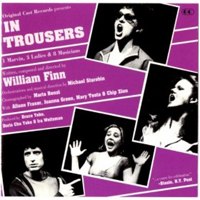 Original Off-Broadway Cast, 1979 (Original Cast Records)
Original Off-Broadway Cast, 1979 (Original Cast Records)  (5 / 5) Long before the William Finn character known simply as Marvin experienced joy and pain in March of the Falsettos, Falsettoland, or the amalgam known and celebrated as Falsettos, he was introduced in this 1979 work. The show never achieved the prominence of Finn’s other “Marvin Musicals,” but it’s by far the most tuneful. Finn’s lyrics here are sometimes tough to understand; the opening song, “Marvin’s Giddy Seizures,” suggests that In Trousers will be about an epileptic rather than a bisexual who’s leaving his wife for a man (Whizzer, who never appears in the show, although he’s frequently referenced). But, oh, what a glorious set of Finn melodies! “High School Ladies at Five O’Clock” is an infectious number that will have you playing it over again and again. “Whizzer Going Down” might be described as an Americanized version of Edith Piaf’s irresistible “Milord,” and what could be a higher compliment than that? “How Marvin Eats His Breakfast” doesn’t just have a memorable melody, but also a fascinating lyric: We get a young child’s point of view in wanting to eat right now. In this song and others, Chip Zien as Mavin is sensational in his first major role. — Peter Filichia
(5 / 5) Long before the William Finn character known simply as Marvin experienced joy and pain in March of the Falsettos, Falsettoland, or the amalgam known and celebrated as Falsettos, he was introduced in this 1979 work. The show never achieved the prominence of Finn’s other “Marvin Musicals,” but it’s by far the most tuneful. Finn’s lyrics here are sometimes tough to understand; the opening song, “Marvin’s Giddy Seizures,” suggests that In Trousers will be about an epileptic rather than a bisexual who’s leaving his wife for a man (Whizzer, who never appears in the show, although he’s frequently referenced). But, oh, what a glorious set of Finn melodies! “High School Ladies at Five O’Clock” is an infectious number that will have you playing it over again and again. “Whizzer Going Down” might be described as an Americanized version of Edith Piaf’s irresistible “Milord,” and what could be a higher compliment than that? “How Marvin Eats His Breakfast” doesn’t just have a memorable melody, but also a fascinating lyric: We get a young child’s point of view in wanting to eat right now. In this song and others, Chip Zien as Mavin is sensational in his first major role. — Peter Filichia
Category Archives: G-I
Into the Woods
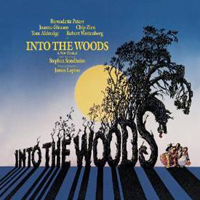 Original Broadway Cast, 1987 (RCA)
Original Broadway Cast, 1987 (RCA)  (3 / 5) One of Stephen Sondheim’s most commercially successful shows, Into the Woods has one of his least distinctive scores. Perhaps he wasn’t really inspired by the fairy tale setting or the characters, most of them lifted from famous stories, or perhaps he and librettist-director James Lapine thought that making the characters self-aware and having them face the realities of “happily ever after” was enough? Aside from an interesting song or two — “No One Is Alone,” “Children Will Listen” — there’s not a lot of “here” here. Considering the setting, the tunes aren’t particularly magical, and some of the lyrics (“There’s no time to sit and dither / While her withers wither with her”) are forced in their cleverness. But the recording showcases some top-notch performers: Bernadette Peters milks the role of the worldly wise witch for all it’s worth; Joanna Gleason brings a thrilling vibe to the part of the Baker’s Wife; and Chip Zien is a neurotic joy as the Baker himself. Tom Aldredge as the narrator, Kim Crosby as Cinderella, Ben Wright as Jack, Danielle Ferland as Little Red Riding Hood, and Kay McClelland and Lauren Mitchell as Cinderella’s bitchy stepsisters are also great. The video of the original Broadway production is a better representation of Into the Woods, but if you can’t find it, this recording will do. — Matthew Murray
(3 / 5) One of Stephen Sondheim’s most commercially successful shows, Into the Woods has one of his least distinctive scores. Perhaps he wasn’t really inspired by the fairy tale setting or the characters, most of them lifted from famous stories, or perhaps he and librettist-director James Lapine thought that making the characters self-aware and having them face the realities of “happily ever after” was enough? Aside from an interesting song or two — “No One Is Alone,” “Children Will Listen” — there’s not a lot of “here” here. Considering the setting, the tunes aren’t particularly magical, and some of the lyrics (“There’s no time to sit and dither / While her withers wither with her”) are forced in their cleverness. But the recording showcases some top-notch performers: Bernadette Peters milks the role of the worldly wise witch for all it’s worth; Joanna Gleason brings a thrilling vibe to the part of the Baker’s Wife; and Chip Zien is a neurotic joy as the Baker himself. Tom Aldredge as the narrator, Kim Crosby as Cinderella, Ben Wright as Jack, Danielle Ferland as Little Red Riding Hood, and Kay McClelland and Lauren Mitchell as Cinderella’s bitchy stepsisters are also great. The video of the original Broadway production is a better representation of Into the Woods, but if you can’t find it, this recording will do. — Matthew Murray
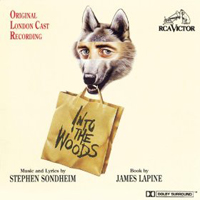 Original London Cast, 1991 (RCA)
Original London Cast, 1991 (RCA)  (2 / 5) This is a nice complement to the original Broadway album, but in no way equal to it. With the exception of Julia McKenzie’s fiercely acted and sung Witch, there’s a stodginess exhibited by many of the leads; Ian Bartholomew and Imelda Staunton lack the distinctive personalities that Zien and Gleason brought to the roles of the Baker and his Wife, and other cast members are similarly challenged by the material. A new song here for the Witch and Rapunzel, “Our Little World,” is musically attractive, but it spoils the original show’s joke about Rapunzel never singing real lyrics, and it doesn’t further the relationship between the two characters. — M.M.
(2 / 5) This is a nice complement to the original Broadway album, but in no way equal to it. With the exception of Julia McKenzie’s fiercely acted and sung Witch, there’s a stodginess exhibited by many of the leads; Ian Bartholomew and Imelda Staunton lack the distinctive personalities that Zien and Gleason brought to the roles of the Baker and his Wife, and other cast members are similarly challenged by the material. A new song here for the Witch and Rapunzel, “Our Little World,” is musically attractive, but it spoils the original show’s joke about Rapunzel never singing real lyrics, and it doesn’t further the relationship between the two characters. — M.M.
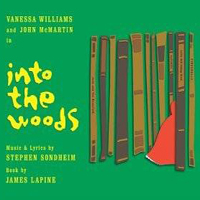 Broadway Cast, 2002 (Nonesuch)
Broadway Cast, 2002 (Nonesuch)  (1 / 5) Almost none of the charm of the original production of Into the Woods survived in the misbegotten revival that yielded this recording. With the exception of Laura Benanti, who brings a purity to Cinderella, these performers are weak. Stephen DeRosa and Kerry O’Malley as the Baker and his Wife are personality-free, and Marylouise Burke massacres much of Jack’s Mother’s music. Vanessa Williams is the dullest Witch imaginable; her singing is adequate at best and grating at worst. Other liabilities include the thinned-down sound of Jonathan Tunick’s orchestrations and the relentless tinkering with the script and score. Some of the changes are unnecessary — for example, the insertion of “Our Little World” and the addition of a second wolf and three pigs to “Hello, Little Girl.” Others are bizarre and damaging, such as having Jack and Little Red chime in on what used to be Cinderella’s big solo, “On the Steps of the Palace.” — M.M.
(1 / 5) Almost none of the charm of the original production of Into the Woods survived in the misbegotten revival that yielded this recording. With the exception of Laura Benanti, who brings a purity to Cinderella, these performers are weak. Stephen DeRosa and Kerry O’Malley as the Baker and his Wife are personality-free, and Marylouise Burke massacres much of Jack’s Mother’s music. Vanessa Williams is the dullest Witch imaginable; her singing is adequate at best and grating at worst. Other liabilities include the thinned-down sound of Jonathan Tunick’s orchestrations and the relentless tinkering with the script and score. Some of the changes are unnecessary — for example, the insertion of “Our Little World” and the addition of a second wolf and three pigs to “Hello, Little Girl.” Others are bizarre and damaging, such as having Jack and Little Red chime in on what used to be Cinderella’s big solo, “On the Steps of the Palace.” — M.M.
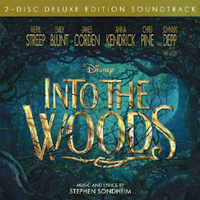 Film Soundtrack, 2014 (Walt Disney)
Film Soundtrack, 2014 (Walt Disney)  (3 / 5) For Sondheim die-hards, no production of Into the Woods ever will, ever could surpass the first, with its robust, indelible performances captured forever on audio as well as video. But the 2014 film version is surprisingly strong, due in no small part to the high quality of its Hollywood-minded casting, and the soundtrack captures this rendition’s strengths while obscuring its flaws. Meryl Streep makes a zesty Witch, singing with conviction (if not always beauty) and playing well opposite the Baker (James Corden at his Everyman best) and his wife (Emily Blunt, in a particularly intelligent performance). Anna Kendrick brings a palpable spunk to her thoughtful Cinderella. As the Princes, Chris Pine and (especially) Billy Magnussen capture the right notes of stuffed-shirt self-indulgence, and the luxurious casting of Tracey Ullman and Christine Baranski as Jack’s Mother and Cinderella’s Stepmother ensure that these roles don’t get short shrift in terms of comedy. There’s definitely room to quibble: The changes to the original material, including the cutting of a few songs, don’t really serve the property well; Johnny Depp is too weird to be threatening as the Wolf; and while Lilla Crawford as Little Red Riding Hood and Daniel Huttlestone as Jack do well by their songs, they’re too young and unseasoned to give their characters the complexities they need. But combine all that does work with a gorgeous-sounding orchestra (playing expanded versions of Jonathan Tunick’s orchestrations under original conductor Paul Gemignani), and the result is a better stage-to-screen translation than all but the most fervent Sondheim acolytes had any right to hope for. — M.M.
(3 / 5) For Sondheim die-hards, no production of Into the Woods ever will, ever could surpass the first, with its robust, indelible performances captured forever on audio as well as video. But the 2014 film version is surprisingly strong, due in no small part to the high quality of its Hollywood-minded casting, and the soundtrack captures this rendition’s strengths while obscuring its flaws. Meryl Streep makes a zesty Witch, singing with conviction (if not always beauty) and playing well opposite the Baker (James Corden at his Everyman best) and his wife (Emily Blunt, in a particularly intelligent performance). Anna Kendrick brings a palpable spunk to her thoughtful Cinderella. As the Princes, Chris Pine and (especially) Billy Magnussen capture the right notes of stuffed-shirt self-indulgence, and the luxurious casting of Tracey Ullman and Christine Baranski as Jack’s Mother and Cinderella’s Stepmother ensure that these roles don’t get short shrift in terms of comedy. There’s definitely room to quibble: The changes to the original material, including the cutting of a few songs, don’t really serve the property well; Johnny Depp is too weird to be threatening as the Wolf; and while Lilla Crawford as Little Red Riding Hood and Daniel Huttlestone as Jack do well by their songs, they’re too young and unseasoned to give their characters the complexities they need. But combine all that does work with a gorgeous-sounding orchestra (playing expanded versions of Jonathan Tunick’s orchestrations under original conductor Paul Gemignani), and the result is a better stage-to-screen translation than all but the most fervent Sondheim acolytes had any right to hope for. — M.M.
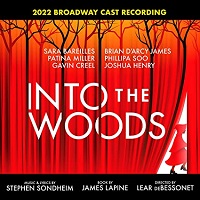 Broadway Cast, 2022 (Craft Recordings)
Broadway Cast, 2022 (Craft Recordings)  (3 / 5) Here we have an Into the Woods that went back to the basics. Director Lear deBessonet’s acclaimed revival took an approach counter to that of the several productions over the years that have clouded the musical’s virtues with outlandish designs, misguided concepts, and detrimental rewrites. Instead, deBessonet and her ensemble simply presented the show as it was originally written, and the approach was most welcome. That isn’t to say that the resulting cast album is perfect, or even the best one that exists. While this is perhaps the best sung Woods on record, and the crisp, balanced audio gives us the best capture of Jonathan Tunick’s original orchestrations to date, there are still some flaws, including a rather lackadaisical energy to the lovely-sounding performances. Sara Bareilles is the most endearing Baker’s Wife since Joanna Gleason, and her smooth alto fits Sondheim’s score perfectly, but she and Brian d’Arcy James’s Baker often come across as laid back rather than motivated and driven. Similarly, Patina Miller’s Witch is a bit too restrained and controlled to give “Stay with Me” the bleeding heart or “Last Midnight” the wild thrills that Bernadette Peters so memorably brought to these songs. Most of the rest of the cast is similarly rich vocally but casual dramatically. One exception, though not in a good way, is Julia Lester’s Little Red; while a standout on stage, Lester did not scale down her performance for the recording medium, and so she comes off as overly brash in the part. Still, because of the quality of the voices, one will likely find much to enjoy in listening to Bareilles’ “Moments in the Woods,” Phillipa Soo as Cinderella in “No One Is Alone,” and “Agony” with an entertaining Gavin Creel (Cinderella’s Prince) and Joshua Henry (Rapunzel’s Prince). It may just be that no cast album of Into the Woods will ever be able to fully capture what makes the show special, but a strong recording of the material with no intrusive embellishments is a pleasure to hear. — Matt Koplik
(3 / 5) Here we have an Into the Woods that went back to the basics. Director Lear deBessonet’s acclaimed revival took an approach counter to that of the several productions over the years that have clouded the musical’s virtues with outlandish designs, misguided concepts, and detrimental rewrites. Instead, deBessonet and her ensemble simply presented the show as it was originally written, and the approach was most welcome. That isn’t to say that the resulting cast album is perfect, or even the best one that exists. While this is perhaps the best sung Woods on record, and the crisp, balanced audio gives us the best capture of Jonathan Tunick’s original orchestrations to date, there are still some flaws, including a rather lackadaisical energy to the lovely-sounding performances. Sara Bareilles is the most endearing Baker’s Wife since Joanna Gleason, and her smooth alto fits Sondheim’s score perfectly, but she and Brian d’Arcy James’s Baker often come across as laid back rather than motivated and driven. Similarly, Patina Miller’s Witch is a bit too restrained and controlled to give “Stay with Me” the bleeding heart or “Last Midnight” the wild thrills that Bernadette Peters so memorably brought to these songs. Most of the rest of the cast is similarly rich vocally but casual dramatically. One exception, though not in a good way, is Julia Lester’s Little Red; while a standout on stage, Lester did not scale down her performance for the recording medium, and so she comes off as overly brash in the part. Still, because of the quality of the voices, one will likely find much to enjoy in listening to Bareilles’ “Moments in the Woods,” Phillipa Soo as Cinderella in “No One Is Alone,” and “Agony” with an entertaining Gavin Creel (Cinderella’s Prince) and Joshua Henry (Rapunzel’s Prince). It may just be that no cast album of Into the Woods will ever be able to fully capture what makes the show special, but a strong recording of the material with no intrusive embellishments is a pleasure to hear. — Matt Koplik
Inside U.S.A.
 Original Cast Members, 1948 (SHB-Show-Biz Productions/Sepia)
Original Cast Members, 1948 (SHB-Show-Biz Productions/Sepia)  (3 / 5) Almost forgotten today but the second-longest-running revue of 1948, this Howard Dietz-Arthur Schwartz opus inspired by John Gunther’s best-seller had a starry cast, yielded two minor hit ballads (“Haunted Heart” and “Rhode Island Is Famous for You”), and displayed some of the old ingenuity that peppered the team’s 1930s revue output. The reconstituted cast album, assembled from scratchy 78s and topping out at 28 minutes, boasts no rediscovered gems but shows off its cast ably; and the opening title number, with a lobotomized-sounding chorus exuding “The USA is gay, uproarious / In a glorious way,” fully evokes mid-century nationalism. Pearl Bailey exudes her patented lazy hauteur in “Protect Me” and “Blue Grass,” while Jack Haley puts over all of the playful “Rhode Island” puns (“Pencils come from Pennsylvania / Vests from Vest Virginia / And tents from Tentassee”). Beatrice Lillie plays a happy convict in “Atlanta,” a deranged choral director in “Come, O Come,” and a jolly reveler in “Mardi Gras.” Billy Williams, not of the original company, somehow landed on the album; he delivers an undistinguished cowboy ballad. The cast of the show also included Jack Cassidy in the chorus and Carl Reiner delivering monologues but, alas, you won’t hear them here. [Note: The Sepia CD release also includes selections from The Band Wagon with Fred and Adele Astaire.] — Marc Miller
(3 / 5) Almost forgotten today but the second-longest-running revue of 1948, this Howard Dietz-Arthur Schwartz opus inspired by John Gunther’s best-seller had a starry cast, yielded two minor hit ballads (“Haunted Heart” and “Rhode Island Is Famous for You”), and displayed some of the old ingenuity that peppered the team’s 1930s revue output. The reconstituted cast album, assembled from scratchy 78s and topping out at 28 minutes, boasts no rediscovered gems but shows off its cast ably; and the opening title number, with a lobotomized-sounding chorus exuding “The USA is gay, uproarious / In a glorious way,” fully evokes mid-century nationalism. Pearl Bailey exudes her patented lazy hauteur in “Protect Me” and “Blue Grass,” while Jack Haley puts over all of the playful “Rhode Island” puns (“Pencils come from Pennsylvania / Vests from Vest Virginia / And tents from Tentassee”). Beatrice Lillie plays a happy convict in “Atlanta,” a deranged choral director in “Come, O Come,” and a jolly reveler in “Mardi Gras.” Billy Williams, not of the original company, somehow landed on the album; he delivers an undistinguished cowboy ballad. The cast of the show also included Jack Cassidy in the chorus and Carl Reiner delivering monologues but, alas, you won’t hear them here. [Note: The Sepia CD release also includes selections from The Band Wagon with Fred and Adele Astaire.] — Marc Miller
I’m Getting My Act Together and Taking It on the Road
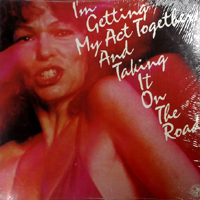 Original Off-Broadway Cast, 1978 (Columbia/Fynsworth Alley/Masterworks Broadway)
Original Off-Broadway Cast, 1978 (Columbia/Fynsworth Alley/Masterworks Broadway)  (3 / 5) The book and lyrics are by Gretchen Cryer, who also plays the lead character, Heather. The music is by Nancy Ford. These two had teamed previously on unsuccessful shows, but I’m Getting My Act Together and Taking It on the Road finally put them on the map. Heather, well played and sung by Cryer, is a soap opera star who’s rehearsing for the opening of her cabaret act. All the songs are presented as part of the rehearsal, which is attended by Heather’s manager and old friend, Joe (a non-singing role). Heather and her two female backup singers do all the vocalizing, with an occasional assist from a band member. The year was 1978, when many women were working toward self-actualization; so the songs, all ostensibly written by Heather, are autobiographical, and Joe has issues with them. The song titles suggest their contents: “Miss America,” “Strong Woman Number,” “Smile (for Daddy),” “Lonely Lady,” and “Old Friend,” now a cabaret classic. Cryer’s terrific backup ladies are Betty Aberlin and Margot Rose. The band includes Don Scardino as the young guitarist Jake, who sweetly sings “In a Simple Way, I Love You.” The 11 songs (plus one reprise) are all in a late-1970s pop vein and are given no theatrical context on the recording, which is an easy listen but not a theatrically engaging one. — Jeffrey Dunn
(3 / 5) The book and lyrics are by Gretchen Cryer, who also plays the lead character, Heather. The music is by Nancy Ford. These two had teamed previously on unsuccessful shows, but I’m Getting My Act Together and Taking It on the Road finally put them on the map. Heather, well played and sung by Cryer, is a soap opera star who’s rehearsing for the opening of her cabaret act. All the songs are presented as part of the rehearsal, which is attended by Heather’s manager and old friend, Joe (a non-singing role). Heather and her two female backup singers do all the vocalizing, with an occasional assist from a band member. The year was 1978, when many women were working toward self-actualization; so the songs, all ostensibly written by Heather, are autobiographical, and Joe has issues with them. The song titles suggest their contents: “Miss America,” “Strong Woman Number,” “Smile (for Daddy),” “Lonely Lady,” and “Old Friend,” now a cabaret classic. Cryer’s terrific backup ladies are Betty Aberlin and Margot Rose. The band includes Don Scardino as the young guitarist Jake, who sweetly sings “In a Simple Way, I Love You.” The 11 songs (plus one reprise) are all in a late-1970s pop vein and are given no theatrical context on the recording, which is an easy listen but not a theatrically engaging one. — Jeffrey Dunn
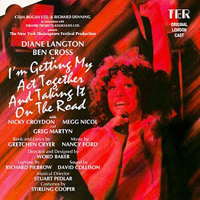 Original London Cast, 1981 (JAY)
Original London Cast, 1981 (JAY)  (4 / 5) This recording tries to impart a feeling of the entire show. Much dialogue is included, and the non-singing character Joe is an essential part of the proceedings. The song list is augmented by a version of “In a Simple Way, I Love You” for Heather and a fun throwaway number for Jake, “If Only Things Was Different.” Diane Langton is Heather, and Ben Cross is Joe. Langton’s singing is solid throughout; she belts “Happy Birthday” and “Natural High” with conviction, and is remarkably touching in “Old Friend” and “Dear Tom” (about Heather’s ex-husband). Throughout the recording, she receives strong vocal support from Nicky Croydon and Megg Nicol. Gregg Martyn sings attractively as Jake, who flirts with Heather but is rejected because she finds him too young. (To get this plot point from the Off-Broadway cast album, you must read the synopsis.) All the songs are very well set up by the dialogue, and therefore seem to have more of an emotional center here than they do on the the previous recording. Having Cross as Joe fully participate in the recorded action gives Heather an obstacle to play against, so the listener is aware of what is at stake within each number. The argument over how much dialogue, if any, should be included on cast albums is endless, but comparison of this recording with the one reviewed above demonstrates how a show’s songs come across with greater strength on a recording when put in their dramatic context. — J.D.
(4 / 5) This recording tries to impart a feeling of the entire show. Much dialogue is included, and the non-singing character Joe is an essential part of the proceedings. The song list is augmented by a version of “In a Simple Way, I Love You” for Heather and a fun throwaway number for Jake, “If Only Things Was Different.” Diane Langton is Heather, and Ben Cross is Joe. Langton’s singing is solid throughout; she belts “Happy Birthday” and “Natural High” with conviction, and is remarkably touching in “Old Friend” and “Dear Tom” (about Heather’s ex-husband). Throughout the recording, she receives strong vocal support from Nicky Croydon and Megg Nicol. Gregg Martyn sings attractively as Jake, who flirts with Heather but is rejected because she finds him too young. (To get this plot point from the Off-Broadway cast album, you must read the synopsis.) All the songs are very well set up by the dialogue, and therefore seem to have more of an emotional center here than they do on the the previous recording. Having Cross as Joe fully participate in the recorded action gives Heather an obstacle to play against, so the listener is aware of what is at stake within each number. The argument over how much dialogue, if any, should be included on cast albums is endless, but comparison of this recording with the one reviewed above demonstrates how a show’s songs come across with greater strength on a recording when put in their dramatic context. — J.D.
I Love You, You’re Perfect, Now Change
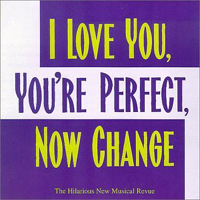 Off-Broadway Cast, 1996 (Varèse Sarabande)
Off-Broadway Cast, 1996 (Varèse Sarabande)  (4 / 5) “Oh my God, that’s me up there!” was an audience whisper heard often during the long run of this musical revue, the winning work of Joe DiPietro (lyrics) and Jimmy Roberts (music). Unapologetically middlebrow and critic-proof, the show is not the wittiest or most profound examination of male-female relationships ever written, but it’s a parade of good revue ideas smartly developed: nerds on a date, macho posturing, the shortage of straight, single men, baby-talking parents, geriatric romance, and more. Roberts relies on pastiche — some Lite-FM rock here, a sweet ballad there — and the music supports rather than overwhelms the lyrics. DiPietro rhymes a bit lazily and sometimes stumbles to weak endings, but the general tenor of the songs is likeable. All of the cast members sing well and slip effortlessly in and out of varied characterizations: Danny Burstein as an alpha male blubbering through a chick flick; Jennifer Simard as a mousy date; Melissa Weil bemoaning a bridesmaid’s plight (“For Tabitha, I wore taffeta / You never should, people laugh at ya”); and Robert Roznowski in the generic but affecting “Shouldn’t I Be Less in Love With You?” Roberts did his own vocal and instrumental arrangements, which are as modest and to-the-point as the show itself. — Marc Miller
(4 / 5) “Oh my God, that’s me up there!” was an audience whisper heard often during the long run of this musical revue, the winning work of Joe DiPietro (lyrics) and Jimmy Roberts (music). Unapologetically middlebrow and critic-proof, the show is not the wittiest or most profound examination of male-female relationships ever written, but it’s a parade of good revue ideas smartly developed: nerds on a date, macho posturing, the shortage of straight, single men, baby-talking parents, geriatric romance, and more. Roberts relies on pastiche — some Lite-FM rock here, a sweet ballad there — and the music supports rather than overwhelms the lyrics. DiPietro rhymes a bit lazily and sometimes stumbles to weak endings, but the general tenor of the songs is likeable. All of the cast members sing well and slip effortlessly in and out of varied characterizations: Danny Burstein as an alpha male blubbering through a chick flick; Jennifer Simard as a mousy date; Melissa Weil bemoaning a bridesmaid’s plight (“For Tabitha, I wore taffeta / You never should, people laugh at ya”); and Robert Roznowski in the generic but affecting “Shouldn’t I Be Less in Love With You?” Roberts did his own vocal and instrumental arrangements, which are as modest and to-the-point as the show itself. — Marc Miller
I Love My Wife
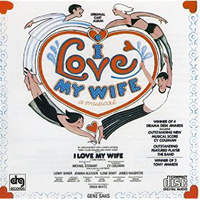 Original Broadway Cast, 1977 (Atlantic/DRG)
Original Broadway Cast, 1977 (Atlantic/DRG)  (2 / 5) “Wife-swapping” was already a dated topic in 1977, but this miniature musical sex farce was the surprise hit of the season. Audiences were taken with the zippy score by Cy Coleman and Michael Stewart (the latter also wrote the book), and by Gene Saks’ clever staging, which featured four onstage musicians commenting on the action involving two inept pairs of married swingers in Trenton, NJ. The show launched the career of comic actor Lenny Baker, who sadly died a few years later before attaining real stardom. From a 21st century vantage point, many of the songs — with their coy sex jokes and titles like “Love Revolution,” “Sexually Free,” “Ev’rybody Today Is Turning On,” and “Married Couple Seeks Married Couple” — come across as so many outtakes from a PG-13 version of Oh! Calcutta! But Coleman is, as always, a true pro, and Stewart’s lyrics are generally nimble and literate. A few numbers are first-class, including the wistful country ballad “Someone Wonderful I Missed” and the touching title tune. The second-act opener, “Hey There, Good Times,” is classic Coleman — an irresistible ragtime stomp — with delicious Stewart lyrics, though it has virtually nothing to do with the plot of the show. The cast, including the young Joanna Gleason, James Naughton, and Ilene Graff, is fine. — David Barbour
(2 / 5) “Wife-swapping” was already a dated topic in 1977, but this miniature musical sex farce was the surprise hit of the season. Audiences were taken with the zippy score by Cy Coleman and Michael Stewart (the latter also wrote the book), and by Gene Saks’ clever staging, which featured four onstage musicians commenting on the action involving two inept pairs of married swingers in Trenton, NJ. The show launched the career of comic actor Lenny Baker, who sadly died a few years later before attaining real stardom. From a 21st century vantage point, many of the songs — with their coy sex jokes and titles like “Love Revolution,” “Sexually Free,” “Ev’rybody Today Is Turning On,” and “Married Couple Seeks Married Couple” — come across as so many outtakes from a PG-13 version of Oh! Calcutta! But Coleman is, as always, a true pro, and Stewart’s lyrics are generally nimble and literate. A few numbers are first-class, including the wistful country ballad “Someone Wonderful I Missed” and the touching title tune. The second-act opener, “Hey There, Good Times,” is classic Coleman — an irresistible ragtime stomp — with delicious Stewart lyrics, though it has virtually nothing to do with the plot of the show. The cast, including the young Joanna Gleason, James Naughton, and Ilene Graff, is fine. — David Barbour
Illya Darling
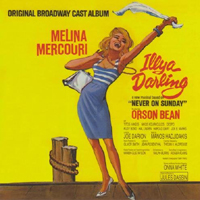 Original Broadway Cast, 1967 (United Artists/Kritzerland) No stars; not recommended. Having had an art-house film hit with Never on Sunday, writer-director Jules Dassin and the Mrs., otherwise known as Melina Mercouri, teamed up again for the stage musical version, which ran more than 300 performances before pretty much vanishing from Broadway’s collective memory. The cast album was very belatedly transferred to CD (in 2008), and even then was only made available in a limited edition. Once again, Mercouri is Illya, the happiest prostitute on the island of Piraeus. This time, Orson Bean is Homer, the dopey American intellectual who wants to introduce her to culture and the finer things in life. The score, with music by Manos Hadjidakis (who did the film) and lyrics by Joe Darion, is heavy with bouzoukis (Ralph Burns orchestrated) and lusty, life-affirming numbers. The only song that stands out is “Never on Sunday” — which, of course, comes from the movie. Mercouri’s smoky voice and sexy intonations are fun to hear, but Bean’s numbers, “Golden Land” and “I Think She Needs Me,” are pretty dire. And “Medea Tango,” which tries to replicate one of the funniest moments in the film (when Illya explains Greek tragedy to Homer), falls flat. The actress Despo, playing a character named Despo, sings “I’Il Never Lay Down Anymore,” a title that tells all. There are also silly local-color items such as “Heaven Help the Sailors on a Night Like This.” — David Barbour
Original Broadway Cast, 1967 (United Artists/Kritzerland) No stars; not recommended. Having had an art-house film hit with Never on Sunday, writer-director Jules Dassin and the Mrs., otherwise known as Melina Mercouri, teamed up again for the stage musical version, which ran more than 300 performances before pretty much vanishing from Broadway’s collective memory. The cast album was very belatedly transferred to CD (in 2008), and even then was only made available in a limited edition. Once again, Mercouri is Illya, the happiest prostitute on the island of Piraeus. This time, Orson Bean is Homer, the dopey American intellectual who wants to introduce her to culture and the finer things in life. The score, with music by Manos Hadjidakis (who did the film) and lyrics by Joe Darion, is heavy with bouzoukis (Ralph Burns orchestrated) and lusty, life-affirming numbers. The only song that stands out is “Never on Sunday” — which, of course, comes from the movie. Mercouri’s smoky voice and sexy intonations are fun to hear, but Bean’s numbers, “Golden Land” and “I Think She Needs Me,” are pretty dire. And “Medea Tango,” which tries to replicate one of the funniest moments in the film (when Illya explains Greek tragedy to Homer), falls flat. The actress Despo, playing a character named Despo, sings “I’Il Never Lay Down Anymore,” a title that tells all. There are also silly local-color items such as “Heaven Help the Sailors on a Night Like This.” — David Barbour
If Love Were All
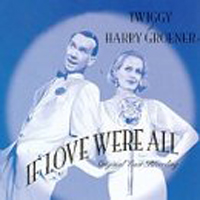 Original Off-Broadway Cast, 1999 (Varèse Sarabande)
Original Off-Broadway Cast, 1999 (Varèse Sarabande)  (4 / 5) In an introductory note, this diversion’s creator Sheridan Morley recalls that Noël Coward and Gertrude Lawrence acted together only twice, in Private Lives and Tonight at 8:30. At that, their performances in those vehicles were in limited runs in London and New York. Yet the two were in love with each other from their first meeting, when he was 13, she was 14, and they were leaving town for a tour; the word “platonic” hardly begins to explain their devotion. In Morley’s soigné revue, Harry Groener is Noël and Twiggy is Gertie. Together and separately, they toss off the master’s ditties as if strewing rose petals about the luxe set of a boulevard comedy. Groener doesn’t imitate Coward’s purr, because he needn’t do so; he’s got his own casual stylings. Since Lawrence was herself rather twiggy, Twiggy is a wonderful choice to sub for the legendary star. Her voice, nasal but always on pitch, is actually an improvement on Lawrence’s. Twiggy solos in “Parisian Pierrot” and duets with Groener in “You Were There” and “I’ll SeeYou Again.” Groener slides through “Mad Dogs and Englishmen” and “Don’t Put Your Daughter on the Stage, Mrs. Worthington.” The talented pair also croon, banter, and tap dance in “Has Anybody Seen Our Ship?” — David Finkle
(4 / 5) In an introductory note, this diversion’s creator Sheridan Morley recalls that Noël Coward and Gertrude Lawrence acted together only twice, in Private Lives and Tonight at 8:30. At that, their performances in those vehicles were in limited runs in London and New York. Yet the two were in love with each other from their first meeting, when he was 13, she was 14, and they were leaving town for a tour; the word “platonic” hardly begins to explain their devotion. In Morley’s soigné revue, Harry Groener is Noël and Twiggy is Gertie. Together and separately, they toss off the master’s ditties as if strewing rose petals about the luxe set of a boulevard comedy. Groener doesn’t imitate Coward’s purr, because he needn’t do so; he’s got his own casual stylings. Since Lawrence was herself rather twiggy, Twiggy is a wonderful choice to sub for the legendary star. Her voice, nasal but always on pitch, is actually an improvement on Lawrence’s. Twiggy solos in “Parisian Pierrot” and duets with Groener in “You Were There” and “I’ll SeeYou Again.” Groener slides through “Mad Dogs and Englishmen” and “Don’t Put Your Daughter on the Stage, Mrs. Worthington.” The talented pair also croon, banter, and tap dance in “Has Anybody Seen Our Ship?” — David Finkle
I Had a Ball
 Original Broadway Cast, 1964 (Mercury/Decca)
Original Broadway Cast, 1964 (Mercury/Decca)  (3 / 5) With Buddy Hackett starring as a Coney Island psychic who screws up his friends’ love lives, it’s safe to say that I Had a Ball doesn’t have a thought in its silly little head. Nobody really liked Jerome Chodorov’s libretto, but the score by Jack Lawrence and Stan Freeman is enjoyable. The songs often seem shoehorned into the plot, yet the melodies are jazzy with an edge of dark sophistication — and with Richard Kiley and Karen Morrow on board, how bad could it be? The flop-plagued Morrow, one of Broadway’s most distinctive voices, delivers thrilling renditions of the title tune and the mordantly cynical “I’ve Got Everything I Want.” Kiley scores with the rueful 11 o’clock number “Fickle Finger of Fate.” Other fun items include the gospel rouser “Faith,” the biting “Neighborhood” (delivered with gusto by Rosetta Le Noire), and the moody quartet “Can It Be Possible?” Hackett is barely present on the disc but, after hearing his big comedy number “Dr. Freud,” we can only be happy about that. Philip J. Lang’s brassy, jazzy orchestrations add to the fun. This is the kind of score that makes show fans treasure flops. Bonus tracks include two studio versions by Morrow of the title tune and the ballad “Almost,” plus instrumental renditions of two cut numbers, “Lament” and “Be a Phony,” by the Lester Lanin Orchestra. — David Barbour
(3 / 5) With Buddy Hackett starring as a Coney Island psychic who screws up his friends’ love lives, it’s safe to say that I Had a Ball doesn’t have a thought in its silly little head. Nobody really liked Jerome Chodorov’s libretto, but the score by Jack Lawrence and Stan Freeman is enjoyable. The songs often seem shoehorned into the plot, yet the melodies are jazzy with an edge of dark sophistication — and with Richard Kiley and Karen Morrow on board, how bad could it be? The flop-plagued Morrow, one of Broadway’s most distinctive voices, delivers thrilling renditions of the title tune and the mordantly cynical “I’ve Got Everything I Want.” Kiley scores with the rueful 11 o’clock number “Fickle Finger of Fate.” Other fun items include the gospel rouser “Faith,” the biting “Neighborhood” (delivered with gusto by Rosetta Le Noire), and the moody quartet “Can It Be Possible?” Hackett is barely present on the disc but, after hearing his big comedy number “Dr. Freud,” we can only be happy about that. Philip J. Lang’s brassy, jazzy orchestrations add to the fun. This is the kind of score that makes show fans treasure flops. Bonus tracks include two studio versions by Morrow of the title tune and the ballad “Almost,” plus instrumental renditions of two cut numbers, “Lament” and “Be a Phony,” by the Lester Lanin Orchestra. — David Barbour
I Do! I Do!
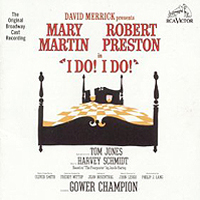 Original Broadway Cast, 1966 (RCA)
Original Broadway Cast, 1966 (RCA)  (5 / 5) A two-character musical based on the play The Fourposter by Jan de Hartog, about a long-married couple, I Do! I Do! holds a mirror up to the audience, allowing us to revel in the universality of our experiences and to feel the enjoyable shock of recognition. Of course, it doesn’t hurt to have Mary Martin and Robert Preston as your leads. This energetic, highly theatrical recording is a knockout; you’d think that listeners would grow tired of a two-person musical, but Tom Jones and Harvey Schmidt have lots of surprises up their sleeves. Schmidt varies his rhythms and melodies wonderfully, while Jones offers some rich, poetic lyrics and some remarkably funny ones, such as “A Well Known Fact” and “Nobody’s Perfect.” The requisite romantic songs include the hit “My Cup Runneth Over.” Among the other highlights of the score are “Where are the Snows of Yesteryear?” and “Someone Needs Me.” — Ken Bloom
(5 / 5) A two-character musical based on the play The Fourposter by Jan de Hartog, about a long-married couple, I Do! I Do! holds a mirror up to the audience, allowing us to revel in the universality of our experiences and to feel the enjoyable shock of recognition. Of course, it doesn’t hurt to have Mary Martin and Robert Preston as your leads. This energetic, highly theatrical recording is a knockout; you’d think that listeners would grow tired of a two-person musical, but Tom Jones and Harvey Schmidt have lots of surprises up their sleeves. Schmidt varies his rhythms and melodies wonderfully, while Jones offers some rich, poetic lyrics and some remarkably funny ones, such as “A Well Known Fact” and “Nobody’s Perfect.” The requisite romantic songs include the hit “My Cup Runneth Over.” Among the other highlights of the score are “Where are the Snows of Yesteryear?” and “Someone Needs Me.” — Ken Bloom
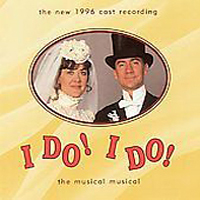 Off-Broadway Cast (1996) (Varèse Sarabande)
Off-Broadway Cast (1996) (Varèse Sarabande)  (2 / 5) This recording features Broadway stalwarts Karen Ziemba and David Garrison as the long-wed Agnes and Michael. Both sing and act the songs very well, but many listeners will prefer the performances of musical theater icons Martin and Preston, and will feel the piano reduction of the score renders this cast album non-competitive with the original recording. Of course, the songs themselves remain as wonderful as ever. — K.B.
(2 / 5) This recording features Broadway stalwarts Karen Ziemba and David Garrison as the long-wed Agnes and Michael. Both sing and act the songs very well, but many listeners will prefer the performances of musical theater icons Martin and Preston, and will feel the piano reduction of the score renders this cast album non-competitive with the original recording. Of course, the songs themselves remain as wonderful as ever. — K.B.
I Can Get It For You Wholesale
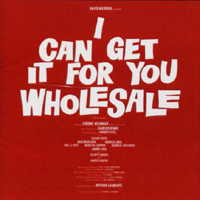 Original Broadway Cast, 1962 (Columbia/Sony)
Original Broadway Cast, 1962 (Columbia/Sony)  (3 / 5) This show has gone down in history for having launched the career of Barbra Streisand, but there’s so much more here. Jerome Weidman adapted his own novel about a Seventh Avenue go-getter who sells his soul for shmattehs. Composer-lyricist Harold Rome’s score percolates with energy. Elliot Gould stars as schemer Harry Bogen, displaying plenty of nasty vitality in numbers like “The Way Things Are” and “The Sound of Money.” This is, however, an ensemble show filled with vividly etched character portraits. Marilyn Cooper, as the girl who loves Harry, delivers two wry ballads: “When Gemini Meets Capricorn” and “Who Knows?” Ken Le Roy and Bambi Linn, as a dress designer and his wife, deliver the lovely “Have I Told You Lately?” Lillian Roth, as Harry’s doting mother, offers chicken soup for the soul in the introspective “Too Soon” and the chilling “Eat a Little Something.” And yes, Streisand hits the comedy number “Miss Marmelstein” out of the park. Rome’s lyrics evoke a world of middle-class Jews who work in the garment trade, while his music merges jazz with Yiddish harmonies and a touch of Leonard Bernstein. Sid Rarnin’s percussive orchestrations are among the most unique of the period. It’s an underrated, distinctive achievement. — David Barbour
(3 / 5) This show has gone down in history for having launched the career of Barbra Streisand, but there’s so much more here. Jerome Weidman adapted his own novel about a Seventh Avenue go-getter who sells his soul for shmattehs. Composer-lyricist Harold Rome’s score percolates with energy. Elliot Gould stars as schemer Harry Bogen, displaying plenty of nasty vitality in numbers like “The Way Things Are” and “The Sound of Money.” This is, however, an ensemble show filled with vividly etched character portraits. Marilyn Cooper, as the girl who loves Harry, delivers two wry ballads: “When Gemini Meets Capricorn” and “Who Knows?” Ken Le Roy and Bambi Linn, as a dress designer and his wife, deliver the lovely “Have I Told You Lately?” Lillian Roth, as Harry’s doting mother, offers chicken soup for the soul in the introspective “Too Soon” and the chilling “Eat a Little Something.” And yes, Streisand hits the comedy number “Miss Marmelstein” out of the park. Rome’s lyrics evoke a world of middle-class Jews who work in the garment trade, while his music merges jazz with Yiddish harmonies and a touch of Leonard Bernstein. Sid Rarnin’s percussive orchestrations are among the most unique of the period. It’s an underrated, distinctive achievement. — David Barbour
 Off-Broadway Cast, 2023 (Concord Theatricals)
Off-Broadway Cast, 2023 (Concord Theatricals)  (4 / 5) This cast recording of an Off-Broadway revisal of I Can Get It For You Wholesale was released belatedly, more than a year after the show completed its limited run in December 2023, but it’s a wonderful opportunity to revisit Harold Rome’s underrated score. Tony Award-winner Santino Fontana leads the company as the ambitious heel Harry Bogen, bringing to the role a higher level of vocal talent than Elliot Gould displays on the original cast album. Rebecca Naomi Jones does a fine job with all of Ruthie’s stellar solo moments, sounding particularly sweet in “Who Knows?” In addition, Jones gets a song not included on the 1962 recording: a bubbly duet, titled “Grab Them While I Can / A Gift Is Not Enough,” for Ruthie and Bogen’s other love interest, Martha (superbly portrayed by Joy Woods). Adam Chanler-Berat and Sarah Steele add some panache with their rendition of the soft-shoe ditty “Have I Told You Lately?” As if our cups weren’t already running over, Judy Kuhn is on hand as Mrs. Bogen, Harry’s adoring mother. Although she’s not afforded an opportunity to fully show off her vocal mettle here, Kuhn sings hauntingly in “Too Soon” and “Eat A Little Something.” Taking on Barbara Streisand’s breakout role of Miss Marmelstein, Julia Lester is zany and full of personality, and if her interpretation isn’t quite equal to Streisand’s (how could it be?), it’s distinctive in its own right and worthy of praise. This revisal reshuffled the order of some of the songs as compared to the original production, and there were some cuts and other changes. (The production featured book revisions by Jerome Weidman’s son, John Weidman, best known for his work on the Stephen Sondheim musicals Pacific Overtures, Assassins, and Road Show.) Jacinth Greywoode’s orchestrations are simple and charming, even if they can’t be wholeheartedly recommended over the fuller versions heard on the Broadway cast album. Note: Concord released this recording in streaming format only, but included a full and well-designed booklet as a free download. — Forrest Hutchinson
(4 / 5) This cast recording of an Off-Broadway revisal of I Can Get It For You Wholesale was released belatedly, more than a year after the show completed its limited run in December 2023, but it’s a wonderful opportunity to revisit Harold Rome’s underrated score. Tony Award-winner Santino Fontana leads the company as the ambitious heel Harry Bogen, bringing to the role a higher level of vocal talent than Elliot Gould displays on the original cast album. Rebecca Naomi Jones does a fine job with all of Ruthie’s stellar solo moments, sounding particularly sweet in “Who Knows?” In addition, Jones gets a song not included on the 1962 recording: a bubbly duet, titled “Grab Them While I Can / A Gift Is Not Enough,” for Ruthie and Bogen’s other love interest, Martha (superbly portrayed by Joy Woods). Adam Chanler-Berat and Sarah Steele add some panache with their rendition of the soft-shoe ditty “Have I Told You Lately?” As if our cups weren’t already running over, Judy Kuhn is on hand as Mrs. Bogen, Harry’s adoring mother. Although she’s not afforded an opportunity to fully show off her vocal mettle here, Kuhn sings hauntingly in “Too Soon” and “Eat A Little Something.” Taking on Barbara Streisand’s breakout role of Miss Marmelstein, Julia Lester is zany and full of personality, and if her interpretation isn’t quite equal to Streisand’s (how could it be?), it’s distinctive in its own right and worthy of praise. This revisal reshuffled the order of some of the songs as compared to the original production, and there were some cuts and other changes. (The production featured book revisions by Jerome Weidman’s son, John Weidman, best known for his work on the Stephen Sondheim musicals Pacific Overtures, Assassins, and Road Show.) Jacinth Greywoode’s orchestrations are simple and charming, even if they can’t be wholeheartedly recommended over the fuller versions heard on the Broadway cast album. Note: Concord released this recording in streaming format only, but included a full and well-designed booklet as a free download. — Forrest Hutchinson
The Human Comedy
 Original Cast, 1984 (Kilmarnock Records, 2CDs)
Original Cast, 1984 (Kilmarnock Records, 2CDs)  (2 / 5) This show flopped big-time when producer Joseph Papp transferred it to Broadway after a run at his Public Theater. Although billed as “a modern opera by Galt MacDermot and William Dumaresq,” The Human Comedy is really more of an oratorio, complete with a Greek-style chorus. Based on a novel by William Saroyan, this musical tale of a small-town American family during World War II is highly sentimental. Some of the lyrics are poetic, but many are awkward or even nonsensical — for example, “Your voice is in fine, fine fetter.” (What?) However, MacDermot’s music is divine throughout. Among the many highlights: “Ulysses Reaches the Crossing,” “Beautiful Music,” “I’ve Known a Lot of Guys,” and the boogie-woogie duet “I Let Him Kiss Me Once.” The score contains at least two hymns, “When I Am Lost” and “Everlasting,” that have absolutely nothing to do with the action, but they’re so lovely that you probably won’t mind. The cast is a mixed bag: Bonnie Koloc, Stephen Geoffreys, Mary Elizabeth Mastrantonio, and Don Kehr are all fine as various Macauley family members. Also good are Leata Galloway as Diana Steed, Caroline Peyton as Mary Arena, and David Johnson as the trainman. On the other hand, young Josh Blake is almost unlistenable as Ulysses Macauley, and Rex Smith is vocally miscast as Spangler. The sound quality of the recording is odd; apparently, it was made onstage with no audience present. As for the CD edition, be aware that, for some reason, the two discs are not tracked at all, so the only way to access particular songs is to use search buttons on your player. Contributing to the slapdash feel of the enterprise, the accompanying booklet leaves out the recording date and repeatedly misspells Saroyan’s name (as “Saroyen”). The Human Comedy definitely deserves to be heard but, given all that’s wrong with the expensive, privately produced CD set, you’d be better off purchasing the recording in MP3 format. — Michael Portantiere
(2 / 5) This show flopped big-time when producer Joseph Papp transferred it to Broadway after a run at his Public Theater. Although billed as “a modern opera by Galt MacDermot and William Dumaresq,” The Human Comedy is really more of an oratorio, complete with a Greek-style chorus. Based on a novel by William Saroyan, this musical tale of a small-town American family during World War II is highly sentimental. Some of the lyrics are poetic, but many are awkward or even nonsensical — for example, “Your voice is in fine, fine fetter.” (What?) However, MacDermot’s music is divine throughout. Among the many highlights: “Ulysses Reaches the Crossing,” “Beautiful Music,” “I’ve Known a Lot of Guys,” and the boogie-woogie duet “I Let Him Kiss Me Once.” The score contains at least two hymns, “When I Am Lost” and “Everlasting,” that have absolutely nothing to do with the action, but they’re so lovely that you probably won’t mind. The cast is a mixed bag: Bonnie Koloc, Stephen Geoffreys, Mary Elizabeth Mastrantonio, and Don Kehr are all fine as various Macauley family members. Also good are Leata Galloway as Diana Steed, Caroline Peyton as Mary Arena, and David Johnson as the trainman. On the other hand, young Josh Blake is almost unlistenable as Ulysses Macauley, and Rex Smith is vocally miscast as Spangler. The sound quality of the recording is odd; apparently, it was made onstage with no audience present. As for the CD edition, be aware that, for some reason, the two discs are not tracked at all, so the only way to access particular songs is to use search buttons on your player. Contributing to the slapdash feel of the enterprise, the accompanying booklet leaves out the recording date and repeatedly misspells Saroyan’s name (as “Saroyen”). The Human Comedy definitely deserves to be heard but, given all that’s wrong with the expensive, privately produced CD set, you’d be better off purchasing the recording in MP3 format. — Michael Portantiere
How to Succeed in Business Without Really Trying
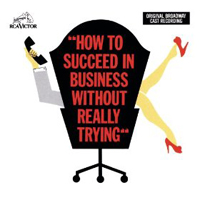 Original Broadway Cast, 1961 (RCA)
Original Broadway Cast, 1961 (RCA)  (4 / 5) George S. Kaufman said that “satire is what closes on Saturday night,” but that certainly did not apply to How to Succeed in Business Without Really Trying. In its original Broadway run, the show saw three-and-a-half-years’ worth of Saturday nights. With an incisive book by Abe Burrows, Jack Weinstock, and Willie Gilbert, this is a musical comedy that’s truly funny — and it’s got a great Frank Loesser score, from the mock-romantic “Happy to Keep His Dinner Warm” and the intentionally syrupy “Love From a Heart of Gold” to the caffeine-inspired “Coffee Break.” Other highlights are the business-rule numbers “The Company Way” and “A Secretary Is Not a Toy.” Judging by this recording, the original cast was energetic, but star Robert Morse is an acquired taste — and there’s a lot of him here. Although he has the right kind of youthful ebullience for go-getter J. Pierrepont Finch, his singing is best described as “characterful” rather than good. Morse’s leading lady, Bonnie Scott, tends to bray Rosemary’s songs. Charles Nelson Reilly as Finch’s rival, Bud Frump, and Rudy Vallee as company president J. B. Biggley come across much better, as do Sammy Smith and Virginia Martin in their supporting roles. Overall, How to Succeed… succeeds nicely. — Matthew Murray
(4 / 5) George S. Kaufman said that “satire is what closes on Saturday night,” but that certainly did not apply to How to Succeed in Business Without Really Trying. In its original Broadway run, the show saw three-and-a-half-years’ worth of Saturday nights. With an incisive book by Abe Burrows, Jack Weinstock, and Willie Gilbert, this is a musical comedy that’s truly funny — and it’s got a great Frank Loesser score, from the mock-romantic “Happy to Keep His Dinner Warm” and the intentionally syrupy “Love From a Heart of Gold” to the caffeine-inspired “Coffee Break.” Other highlights are the business-rule numbers “The Company Way” and “A Secretary Is Not a Toy.” Judging by this recording, the original cast was energetic, but star Robert Morse is an acquired taste — and there’s a lot of him here. Although he has the right kind of youthful ebullience for go-getter J. Pierrepont Finch, his singing is best described as “characterful” rather than good. Morse’s leading lady, Bonnie Scott, tends to bray Rosemary’s songs. Charles Nelson Reilly as Finch’s rival, Bud Frump, and Rudy Vallee as company president J. B. Biggley come across much better, as do Sammy Smith and Virginia Martin in their supporting roles. Overall, How to Succeed… succeeds nicely. — Matthew Murray
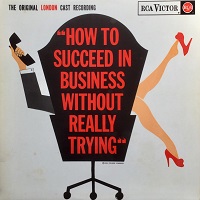 Original London Cast, 1963 (RCA)
Original London Cast, 1963 (RCA)  (4 / 5) Out of print for decades, this recording is worth seeking out as a delightful addendum to the original Broadway cast album. Happily, a few minor slips notwithstanding, the members of the cast who are actually British manage to sound convincingly American here — a vital point, as this satirical tale of brash go-getters doing their thing in the dog-eat-dog business world of Manhattan circa the early 1960s would seem off kilter with clipped English accents. That said, the two male leads, Warren Berlinger as Finch and Billy De Wolfe as J.B. Biggley, are in fact American, and both give performances worthy of comparison to their predecessors in these roles. Berlinger’s singing is about as good as Robert Morse’s, and his characterization is pretty much equal in terms of charm and skillfully understated comic finesse. No one would contend that De Wolfe’s voice is as rich as that of Rudy Vallee, but since Biggley’s songs require more in terms of personality than sheer vocal quality (which is the case with most of this score), De Wolfe is terrific in the role. As for the rest of the cast, it’s a safe bet that most listeners will find Patricia Michael’s sound far more pleasing than Bonnie Scott’s in Rosemary’s songs, and both David Knight and Josephine Blake are right on point as Frump and Smitty. This recording is so rare that I have only been able to track it down and hear it in mono, but with that qualification, the sound quality is excellent overall, as is the musical direction and the work of the ensemble. Some interesting trivia: “The Company Way” is performed here by Berlinger and Bernard Spear (as Twimble) in a higher key than the original, and several of the lyrics in other songs have been cleverly rewritten to remove certain references (to F.A.O. Schwartz, Bergdorf-Goodman, Lionel toy trains, the 21 Club, Tarrytown, etc.) that presumably would have been unfamiliar to London audiences. Funnily enough, the “work/clerk” rhyme in “Been a Long Day” remains, despite the fact that those two words don’t rhyme as Brits pronounce them 🙂 — Michael Portantiere
(4 / 5) Out of print for decades, this recording is worth seeking out as a delightful addendum to the original Broadway cast album. Happily, a few minor slips notwithstanding, the members of the cast who are actually British manage to sound convincingly American here — a vital point, as this satirical tale of brash go-getters doing their thing in the dog-eat-dog business world of Manhattan circa the early 1960s would seem off kilter with clipped English accents. That said, the two male leads, Warren Berlinger as Finch and Billy De Wolfe as J.B. Biggley, are in fact American, and both give performances worthy of comparison to their predecessors in these roles. Berlinger’s singing is about as good as Robert Morse’s, and his characterization is pretty much equal in terms of charm and skillfully understated comic finesse. No one would contend that De Wolfe’s voice is as rich as that of Rudy Vallee, but since Biggley’s songs require more in terms of personality than sheer vocal quality (which is the case with most of this score), De Wolfe is terrific in the role. As for the rest of the cast, it’s a safe bet that most listeners will find Patricia Michael’s sound far more pleasing than Bonnie Scott’s in Rosemary’s songs, and both David Knight and Josephine Blake are right on point as Frump and Smitty. This recording is so rare that I have only been able to track it down and hear it in mono, but with that qualification, the sound quality is excellent overall, as is the musical direction and the work of the ensemble. Some interesting trivia: “The Company Way” is performed here by Berlinger and Bernard Spear (as Twimble) in a higher key than the original, and several of the lyrics in other songs have been cleverly rewritten to remove certain references (to F.A.O. Schwartz, Bergdorf-Goodman, Lionel toy trains, the 21 Club, Tarrytown, etc.) that presumably would have been unfamiliar to London audiences. Funnily enough, the “work/clerk” rhyme in “Been a Long Day” remains, despite the fact that those two words don’t rhyme as Brits pronounce them 🙂 — Michael Portantiere
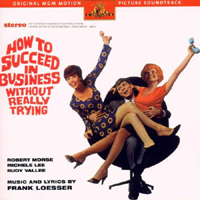 Film Soundtrack, 1967 (United Artists/MGM)
Film Soundtrack, 1967 (United Artists/MGM)  (2 / 5) Several of the original Broadway cast members appear in the film version of How to Succeed…, and Rosemary is played by Michele Lee, who was a replacement in the role on Broadway and on tour. She does a much better job with the songs than Bonnie Scott, sounding warmer and far more natural. However, she doesn’t have many songs: “Happy to Keep His Dinner Warm” and “Paris Original” were both excised from the stage score for the movie. Lee does perform a solo version of “I Believe in You,” but is otherwise heard only in the trio “Been a Long Day.” Robert Morse, Rudy Vallee, Sammy Smith, and Ruth Kobart (as J. B. Biggley’s executive secretary) from the Broadway cast all sound good here, so does John Myhers as Mr. Bratt in “A Secretary is Not a Toy,” and although Anthony Teague doesn’t have Charles Nelson Reilly’s nervous energy, he’s fine as Frump. The “Coffee Break” number may be heard on this soundtrack album but is not in the movie, having been filmed but cut from it. While the incompleteness of this recording diminishes its appeal, avid Frank Loesser fans may value it. — M.M.
(2 / 5) Several of the original Broadway cast members appear in the film version of How to Succeed…, and Rosemary is played by Michele Lee, who was a replacement in the role on Broadway and on tour. She does a much better job with the songs than Bonnie Scott, sounding warmer and far more natural. However, she doesn’t have many songs: “Happy to Keep His Dinner Warm” and “Paris Original” were both excised from the stage score for the movie. Lee does perform a solo version of “I Believe in You,” but is otherwise heard only in the trio “Been a Long Day.” Robert Morse, Rudy Vallee, Sammy Smith, and Ruth Kobart (as J. B. Biggley’s executive secretary) from the Broadway cast all sound good here, so does John Myhers as Mr. Bratt in “A Secretary is Not a Toy,” and although Anthony Teague doesn’t have Charles Nelson Reilly’s nervous energy, he’s fine as Frump. The “Coffee Break” number may be heard on this soundtrack album but is not in the movie, having been filmed but cut from it. While the incompleteness of this recording diminishes its appeal, avid Frank Loesser fans may value it. — M.M.
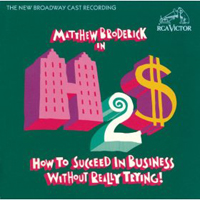 Broadway Cast, 1995 (RCA)
Broadway Cast, 1995 (RCA)  (2 / 5) This is a very full recording. In addition to the show’s voice-over passages (spoken by Walter Cronkite!), it includes some incidental music, a number of reprises, and even the Pirate Dance. The album boasts new orchestrations by Danny Troob that are even brassier than the originals, a reworked “Brotherhood of Man” with a lot of scatting from Lillias White as Miss Jones, and a new second-act opener. There’s also a reprise of the title song (with new lyrics written by the production’s director, Des McAnuff) in place of the cut “Cinderella, Darling.” If these changes aren’t really improvements, neither are they significant detriments. Megan Mullally is an ideal Rosemary, and Victoria Clark provides a very well sung Smitty. Jeff Blumenkrantz is Frump; other roles are well done by Ronn Carroll, Gerry Vichi, and Jonathan Freeman. Luba Mason’s Hedy is a bit too vacant, though she makes quite a vocal effect when she slides up a full octave at the end of “Love From a Heart of Gold.” But then there’s Matthew Broderick, singing and acting in the same constipated style that he would later bring to The Producers and other shows. While he hits all the right notes in Finch’s songs and only sounds strained a couple of times, he never sounds real. — M.M.
(2 / 5) This is a very full recording. In addition to the show’s voice-over passages (spoken by Walter Cronkite!), it includes some incidental music, a number of reprises, and even the Pirate Dance. The album boasts new orchestrations by Danny Troob that are even brassier than the originals, a reworked “Brotherhood of Man” with a lot of scatting from Lillias White as Miss Jones, and a new second-act opener. There’s also a reprise of the title song (with new lyrics written by the production’s director, Des McAnuff) in place of the cut “Cinderella, Darling.” If these changes aren’t really improvements, neither are they significant detriments. Megan Mullally is an ideal Rosemary, and Victoria Clark provides a very well sung Smitty. Jeff Blumenkrantz is Frump; other roles are well done by Ronn Carroll, Gerry Vichi, and Jonathan Freeman. Luba Mason’s Hedy is a bit too vacant, though she makes quite a vocal effect when she slides up a full octave at the end of “Love From a Heart of Gold.” But then there’s Matthew Broderick, singing and acting in the same constipated style that he would later bring to The Producers and other shows. While he hits all the right notes in Finch’s songs and only sounds strained a couple of times, he never sounds real. — M.M.
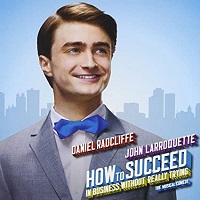 Broadway Cast, 2011 (Decca)
Broadway Cast, 2011 (Decca)  (2 / 5) The first 21st-century Broadway revival (sorry, “revisal”) of How to Succeed was done in by the direction of Rob Ashford, who somehow managed to remove most of the humor from this sharply satirical show and left his cast adrift to fend for themselves — including Daniel Radcliffe, for whom the central star role of J. Pierrepont Finch might have been a perfect fit if he had had a competent director to guide him. But this is one of those not infrequent cases where the cast album is far more pleasurable on its own terms than the production itself. Because we don’t have to endure Ashford’s dimming of the comedy in the show’s dialogue, nor need we experience his deplorable staging and choreography, sometimes overloaded and sometimes inadequate or non existent (such as his having left Radcliffe to stand on stage doing literally nothing during each and every one of those little orchestral interludes in “I Believe in You”), we’re free to enjoy what this production had to offer in terms of musical values. Radcliffe’s singing voice is clear, strong, youthful, and pleasant, his American accent is flawless, and the charm he exhibited in all those Harry Potter films is intact, so his performance here is highly effective, regardless of what it lacked on stage. On the minus side, listeners may wish that John Larroquette had a bit more of a singing voice to bring to Biggley’s musical moments. Standouts in other roles are Rose Hemingway as Rosemary, Tammy Blanchard as Hedy La Rue, and Rob Bartlett as Twimble/Womper, but one’s enjoyment (or not) of this recording may depend largely on how one feels about the aggressive rearrangements and re-orchestrations of the score by David Chase and Doug Besterman. — M.P.
(2 / 5) The first 21st-century Broadway revival (sorry, “revisal”) of How to Succeed was done in by the direction of Rob Ashford, who somehow managed to remove most of the humor from this sharply satirical show and left his cast adrift to fend for themselves — including Daniel Radcliffe, for whom the central star role of J. Pierrepont Finch might have been a perfect fit if he had had a competent director to guide him. But this is one of those not infrequent cases where the cast album is far more pleasurable on its own terms than the production itself. Because we don’t have to endure Ashford’s dimming of the comedy in the show’s dialogue, nor need we experience his deplorable staging and choreography, sometimes overloaded and sometimes inadequate or non existent (such as his having left Radcliffe to stand on stage doing literally nothing during each and every one of those little orchestral interludes in “I Believe in You”), we’re free to enjoy what this production had to offer in terms of musical values. Radcliffe’s singing voice is clear, strong, youthful, and pleasant, his American accent is flawless, and the charm he exhibited in all those Harry Potter films is intact, so his performance here is highly effective, regardless of what it lacked on stage. On the minus side, listeners may wish that John Larroquette had a bit more of a singing voice to bring to Biggley’s musical moments. Standouts in other roles are Rose Hemingway as Rosemary, Tammy Blanchard as Hedy La Rue, and Rob Bartlett as Twimble/Womper, but one’s enjoyment (or not) of this recording may depend largely on how one feels about the aggressive rearrangements and re-orchestrations of the score by David Chase and Doug Besterman. — M.P.
How Now, Dow Jones
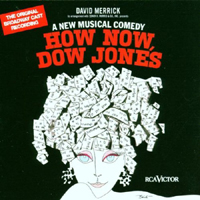 Original Broadway Cast, 1968 (RCA)
Original Broadway Cast, 1968 (RCA)  (3 / 5) The story of a misfit who, rather than committing suicide, decides to try his hand at selling stock, this show made audiences laugh for one season and is hardly remembered today. But the cast album reveals what a creative collaboration the prolific film composer Elmer Bernstein had with the devilishly clever lyricist Carolyn Leigh. How Now, DowJones begins with a clever explanation of the workings of Wall Street (“ABC”), then deals with various characters’ romantic problems. The talented belter Marlyn Mason and the wonderfully zany Brenda Vaccaro raise their voices in “They Don’t Make ‘Em Like That Anymore.” After spending the night with the suicidal Charley (Tony Roberts), Mason’s character sings the excellent ballad “Walk Away.” Charley decides not to jump out of a window when some Wall Streeters tell him that all he must do to succeed is “Gawk, Tousle and Shucks.” He goes off to sell stocks to widows, which leads to the show-stopping ensemble march “Step to the Rear.” Also among the score’s highlights are “Rich Is Better,” “Shakespeare Lied,” and “He’s Here.” — Jeffrey Dunn
(3 / 5) The story of a misfit who, rather than committing suicide, decides to try his hand at selling stock, this show made audiences laugh for one season and is hardly remembered today. But the cast album reveals what a creative collaboration the prolific film composer Elmer Bernstein had with the devilishly clever lyricist Carolyn Leigh. How Now, DowJones begins with a clever explanation of the workings of Wall Street (“ABC”), then deals with various characters’ romantic problems. The talented belter Marlyn Mason and the wonderfully zany Brenda Vaccaro raise their voices in “They Don’t Make ‘Em Like That Anymore.” After spending the night with the suicidal Charley (Tony Roberts), Mason’s character sings the excellent ballad “Walk Away.” Charley decides not to jump out of a window when some Wall Streeters tell him that all he must do to succeed is “Gawk, Tousle and Shucks.” He goes off to sell stocks to widows, which leads to the show-stopping ensemble march “Step to the Rear.” Also among the score’s highlights are “Rich Is Better,” “Shakespeare Lied,” and “He’s Here.” — Jeffrey Dunn
Howard Crabtree’s Whoop-Dee-Doo!
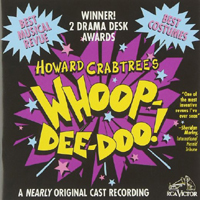 Original Off-Broadway Cast, 1995 (RCA)
Original Off-Broadway Cast, 1995 (RCA)  (3 / 5) This show was the brainchild of costume designer Howard Crabtree, whose outlandishly funny costumes were the real stars of the production—each outfit more elaborate than the last, yet all looking as if they cost pennies to build. Throughout, Crabtree (playing himself) is heckled by Jay Rogers, who questions his taste and preaches that “less is more.” This gives the revue a sort of structure and also a good finish: Howard uses “Less Is More” as a finale that belies its title, going on and on and on. The songs include one about the much-married Elizabeth Taylor, one featuring the Invisible Dance Company (“They’re the biggest no-talents I’ve never seen,” complains Rogers; “I can see right through them!”), and one about Sgt. Sirloin and his corps of patriotic potatoes being shaken by the arrival of Private Banana (“The new recruit is a fruit!”). There’s also a mini-musical about Nancy Reagan’s life, and a number called “You Are My Idol,” in which an airplane accidentally drops a crate of cast albums on a tribe of primitives who assume it’s an offering from the gods and begin worshiping/imitating Ethel Merman, Carol Channing, and Rex Harrison. The sensibility throughout is matter-of-factly gay, although not so much as to make straight folks uncomfortable. The material was mostly written by Mark Waldrop and Dick Gallagher, but there are also contributions by David Rambo, Peter Morris, Brad Ellis, Eric Schorr, Bruce Sussman, and Jack Feldman. — David Wolf
(3 / 5) This show was the brainchild of costume designer Howard Crabtree, whose outlandishly funny costumes were the real stars of the production—each outfit more elaborate than the last, yet all looking as if they cost pennies to build. Throughout, Crabtree (playing himself) is heckled by Jay Rogers, who questions his taste and preaches that “less is more.” This gives the revue a sort of structure and also a good finish: Howard uses “Less Is More” as a finale that belies its title, going on and on and on. The songs include one about the much-married Elizabeth Taylor, one featuring the Invisible Dance Company (“They’re the biggest no-talents I’ve never seen,” complains Rogers; “I can see right through them!”), and one about Sgt. Sirloin and his corps of patriotic potatoes being shaken by the arrival of Private Banana (“The new recruit is a fruit!”). There’s also a mini-musical about Nancy Reagan’s life, and a number called “You Are My Idol,” in which an airplane accidentally drops a crate of cast albums on a tribe of primitives who assume it’s an offering from the gods and begin worshiping/imitating Ethel Merman, Carol Channing, and Rex Harrison. The sensibility throughout is matter-of-factly gay, although not so much as to make straight folks uncomfortable. The material was mostly written by Mark Waldrop and Dick Gallagher, but there are also contributions by David Rambo, Peter Morris, Brad Ellis, Eric Schorr, Bruce Sussman, and Jack Feldman. — David Wolf
House of Flowers
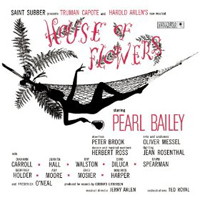 Original Broadway Cast, 1954 (Columbia/Sony)
Original Broadway Cast, 1954 (Columbia/Sony)  (5 / 5) The cast album of Harold Arlen and Truman Capote’s flop musical set in a West Indian bordello is stunning and unique; the steel drums and whistles of the overture announce a 1950s musical with a sound like no other. The opening number, for the girls of the house, promises an unusual frankness for the era, and Capote’s lyrics (“Drowsin’, dreamin,’ moonbeamin’ / ’bout the thing we’re supreme in”) are amazing for a beginner. Pearl Bailey, owning the show as Madame Fleur, throws her weight around in “One Man Ain’t Quite Enough” and caps the number with an outrageous ad lib that passed instantly into cast-album legend. A teenage Diahann Carroll, nursing a cold for the recording session, nonetheless oozes charm and unselfconscious allure in “A Sleepin’ Bee.” And that’s just the first 15 minutes! (More oddball cast album history is made later, when Carroll’s voice gives out near the end of “I Never Has Seen Snow” and Arlen has to dub a high note for her.) It’s a spellbinding score with quirky orchestrations by Ted Royal, thrillingly conducted by Jerry Arlen. For the 2003 CD reissue of this treasured recording, Columbia/Sony remastered everything and made the audio crisper; put the songs in their stage order; found a longer, more sumptuous take of “Mardi Gras”; let the tape run a few seconds longer on “Wait’in'”; and inserted a “Mardi Gras Waltz” from a Percy Faith album. There are other bonus tracks — a single of “Two Ladies in de Shade of de Banana Tree” by cast member Enid Mosier, a tape of Arlen’s first draft of “A Sleepin’ Bee,” and Capote reading an excerpt from his source-material short story — plus a booklet that contains some photos from the gorgeous original production. The cumulative effect is compelling. For a half-century, people have heard this amazing score and wondered why such a show failed. We’re lucky, at least, that House of Flowers yielded one of the great cast albums. — Marc Miller
(5 / 5) The cast album of Harold Arlen and Truman Capote’s flop musical set in a West Indian bordello is stunning and unique; the steel drums and whistles of the overture announce a 1950s musical with a sound like no other. The opening number, for the girls of the house, promises an unusual frankness for the era, and Capote’s lyrics (“Drowsin’, dreamin,’ moonbeamin’ / ’bout the thing we’re supreme in”) are amazing for a beginner. Pearl Bailey, owning the show as Madame Fleur, throws her weight around in “One Man Ain’t Quite Enough” and caps the number with an outrageous ad lib that passed instantly into cast-album legend. A teenage Diahann Carroll, nursing a cold for the recording session, nonetheless oozes charm and unselfconscious allure in “A Sleepin’ Bee.” And that’s just the first 15 minutes! (More oddball cast album history is made later, when Carroll’s voice gives out near the end of “I Never Has Seen Snow” and Arlen has to dub a high note for her.) It’s a spellbinding score with quirky orchestrations by Ted Royal, thrillingly conducted by Jerry Arlen. For the 2003 CD reissue of this treasured recording, Columbia/Sony remastered everything and made the audio crisper; put the songs in their stage order; found a longer, more sumptuous take of “Mardi Gras”; let the tape run a few seconds longer on “Wait’in'”; and inserted a “Mardi Gras Waltz” from a Percy Faith album. There are other bonus tracks — a single of “Two Ladies in de Shade of de Banana Tree” by cast member Enid Mosier, a tape of Arlen’s first draft of “A Sleepin’ Bee,” and Capote reading an excerpt from his source-material short story — plus a booklet that contains some photos from the gorgeous original production. The cumulative effect is compelling. For a half-century, people have heard this amazing score and wondered why such a show failed. We’re lucky, at least, that House of Flowers yielded one of the great cast albums. — Marc Miller
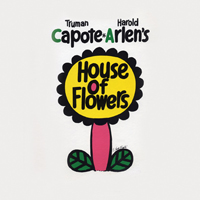 Off-Broadway Cast, 1968 (United Artists/Kritzerland)
Off-Broadway Cast, 1968 (United Artists/Kritzerland)  (1 / 5) Original producer Saint Subber unwisely ordered a major rewrite of House of Flowers for a new, scaled-down Off-Broadway production that yielded this cast album in shrill stereo. Here, the islanders appear more willfully ignorant than disarmingly unworldly. Some great songs (“One Man Ain’t Quite Enough,” “Genna Leave Off Wearin’ My Shoes”) are missing, some lackluster new ones (not entirely by Harold Arlen and Truman Capote) are inserted, and the modest calypso-band arrangements sound like toy whistles next to Ted Royal’s great originals. The musical director, Joe Raposo, plays it so safe that it sounds like he’s warming up for Sesame Street. It’s not the cast’s fault: Yolande Bavan is a charming Ottilie, Thelma Oliver and Hope Clarke are lusty sidekicks, and Novella Nelson gamely grunts out something called “Madame Tango’s Particular Tango.” Replacing Pearl Bailey as Madame Fleur, Josephine Premice is deprived of some of the character’s best material; “Don’t Like Goodbyes,’ which was evidently written for Ottilie and swiped by Bailey, is here restored to its rightful owner. Premice’s unidentifiable accent and inimitable, scratchy singing are ingratiating, but the squirm-inducing moments in this wilted Flowers far outweigh the soul-satisfying ones. If there’s an object lesson in how to ruin a classic score, here it is. — M.M.
(1 / 5) Original producer Saint Subber unwisely ordered a major rewrite of House of Flowers for a new, scaled-down Off-Broadway production that yielded this cast album in shrill stereo. Here, the islanders appear more willfully ignorant than disarmingly unworldly. Some great songs (“One Man Ain’t Quite Enough,” “Genna Leave Off Wearin’ My Shoes”) are missing, some lackluster new ones (not entirely by Harold Arlen and Truman Capote) are inserted, and the modest calypso-band arrangements sound like toy whistles next to Ted Royal’s great originals. The musical director, Joe Raposo, plays it so safe that it sounds like he’s warming up for Sesame Street. It’s not the cast’s fault: Yolande Bavan is a charming Ottilie, Thelma Oliver and Hope Clarke are lusty sidekicks, and Novella Nelson gamely grunts out something called “Madame Tango’s Particular Tango.” Replacing Pearl Bailey as Madame Fleur, Josephine Premice is deprived of some of the character’s best material; “Don’t Like Goodbyes,’ which was evidently written for Ottilie and swiped by Bailey, is here restored to its rightful owner. Premice’s unidentifiable accent and inimitable, scratchy singing are ingratiating, but the squirm-inducing moments in this wilted Flowers far outweigh the soul-satisfying ones. If there’s an object lesson in how to ruin a classic score, here it is. — M.M.
Honky-Tonk Highway
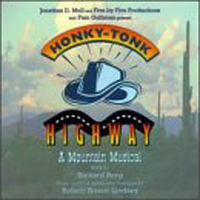 Original Off-Broadway Cast, 1994 (Boebe)
Original Off-Broadway Cast, 1994 (Boebe)  (2 / 5) How much mediocre country music can you take if it’s terrifically well performed? That’s the barometer of how much you’ll enjoy this recording. Robert Nassif-Lindsey (a.k.a, Robert Lindsey Nassif and other variations on his name) wrote a series of old-style country-western songsfor this “mountain musical.” Richard Berg is credited as librettist, with Nassif-Lindsey listed as having provided “additional dialogue,” but the album gives no hint of a plot. As for the songs themselves: “Follow Where the Music Goes” is reasonably catchy; “Baby, I Love Your Biscuits” is sort of fun; and “Easier to Sing Than Say” is kind of pretty. The cast of actors-singers-musicians includes a few stage notables in Sean McCourt, Erin Hill, and Matthew Bennett, alongside Rick Leon, Kevin Fox, and musical director-arranger-performer Steve Steiner. Rich Blacker and Andy Taylor are heard in a few tracks as extra instrumentalists, with Nassif-Lindsey occasionally popping up on piano a few times. The score of Honky-Tonk Highway sounds very different from the composer-lyricist’s work on two other musicals, 3hree and Opal, so this recording is certainly a testament to his range. — Seth Christenfeld
(2 / 5) How much mediocre country music can you take if it’s terrifically well performed? That’s the barometer of how much you’ll enjoy this recording. Robert Nassif-Lindsey (a.k.a, Robert Lindsey Nassif and other variations on his name) wrote a series of old-style country-western songsfor this “mountain musical.” Richard Berg is credited as librettist, with Nassif-Lindsey listed as having provided “additional dialogue,” but the album gives no hint of a plot. As for the songs themselves: “Follow Where the Music Goes” is reasonably catchy; “Baby, I Love Your Biscuits” is sort of fun; and “Easier to Sing Than Say” is kind of pretty. The cast of actors-singers-musicians includes a few stage notables in Sean McCourt, Erin Hill, and Matthew Bennett, alongside Rick Leon, Kevin Fox, and musical director-arranger-performer Steve Steiner. Rich Blacker and Andy Taylor are heard in a few tracks as extra instrumentalists, with Nassif-Lindsey occasionally popping up on piano a few times. The score of Honky-Tonk Highway sounds very different from the composer-lyricist’s work on two other musicals, 3hree and Opal, so this recording is certainly a testament to his range. — Seth Christenfeld
High Button Shoes
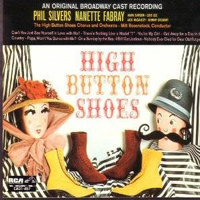 Original Broadway Cast, 1947 (RCA/Sepia)
Original Broadway Cast, 1947 (RCA/Sepia)  (3 / 5) The 24-minute cast album of High Button Shoes contains only eight of the score’s 14 songs; that’s all that could fit on both sides of four 78-rpm records. Two of the show’s numbers became very popular: the soft-shoe “I Still Get Jealous” and the polka “Papa, Won’t You Dance With Me,” both duets for Nanette Fabray and the now-forgotten Jack McCauley. But these songs have pretty much faded from memory. They and the score as a whole, with music by Jule Styne (his first Broadway hit) and lyrics by Sammy Cahn (his only Broadway hit), are as old-fashioned as the show’s title. The secondary lovers get two very arch love ballads, and McCauley sings lead in a nice, swirling waltz. The other three songs feature Phil Silvers. He plays (what else?) a lovable con man who’s fixing a football game in “Nobody Died for Dear Old Rutgers,” giving a family a new car (because he traded them out of their valuable land) in “There’s Nothing Like a Model T,” and extolling the charms of the beach (because he’s managed to escape the law) in “On a Sunday by the Sea.” That beach is the setting for the still-talked-about, much-praised “Mack Sennett Ballet” choreographed by Jerome Robbins. Alas, the music for it is not on this disc, but that’s what the cast album of Jerome Robbins’ Broadway is for. (Note: RCA’s CD transfer of High Button Shoes was only briefly available and is long out of print, but all of the tracks from the album are now available on a single Sepia CD, paired with the original cast recording of Seventeen.) — Peter Filichia
(3 / 5) The 24-minute cast album of High Button Shoes contains only eight of the score’s 14 songs; that’s all that could fit on both sides of four 78-rpm records. Two of the show’s numbers became very popular: the soft-shoe “I Still Get Jealous” and the polka “Papa, Won’t You Dance With Me,” both duets for Nanette Fabray and the now-forgotten Jack McCauley. But these songs have pretty much faded from memory. They and the score as a whole, with music by Jule Styne (his first Broadway hit) and lyrics by Sammy Cahn (his only Broadway hit), are as old-fashioned as the show’s title. The secondary lovers get two very arch love ballads, and McCauley sings lead in a nice, swirling waltz. The other three songs feature Phil Silvers. He plays (what else?) a lovable con man who’s fixing a football game in “Nobody Died for Dear Old Rutgers,” giving a family a new car (because he traded them out of their valuable land) in “There’s Nothing Like a Model T,” and extolling the charms of the beach (because he’s managed to escape the law) in “On a Sunday by the Sea.” That beach is the setting for the still-talked-about, much-praised “Mack Sennett Ballet” choreographed by Jerome Robbins. Alas, the music for it is not on this disc, but that’s what the cast album of Jerome Robbins’ Broadway is for. (Note: RCA’s CD transfer of High Button Shoes was only briefly available and is long out of print, but all of the tracks from the album are now available on a single Sepia CD, paired with the original cast recording of Seventeen.) — Peter Filichia
Honk!
Original Scarborough Cast, 1998 (Dress Circle)  (3 / 5) Welcome to the duck yard, “Where life is nice and steady / Till we’re plucked and oven-ready” and where Ida, a young mom, hatches an egg containing a distinctly odd duck. He is, in fact, the Ugly Duckling. Welcome also to the English songwriting team of George Stiles (music) and Anthony Drewe (lyrics), whose charming adaptation of the Hans Christian Andersen tale was one of the most interesting British musical theater pieces in years. (The show caused a stir in 2000, when it took the Olivier Award for Best Musical over The Lion King.) Honk! follows the Ugly Duckling as he grows up scorned, wanders away, is menaced by a cat, meets a lovely swan, and undergoes various adventures before reuniting with his loved ones. The songs radiate optimism and humor; they’re clever and sophisticated without being showy. There’s also real feeling in such numbers as “Hold Your Head Up High” and “Every Tear a Mother Cries.” Other highlights include “Look at Him,” about the perils of being different, and “You Can Play With Your Food,” sung by that evil cat. The main problem here is length: There are too many songs for this slender tale to bear. The cast, from the Stephen Joseph Theatre in Scarborough, England (run by playwright Alan Ayckbourn), is appealing, especially Richard Dempsey as the Ugly Duckling and Kristin Marks as Ida. But the real stars here are Stiles and Drewe. — David Barbour
(3 / 5) Welcome to the duck yard, “Where life is nice and steady / Till we’re plucked and oven-ready” and where Ida, a young mom, hatches an egg containing a distinctly odd duck. He is, in fact, the Ugly Duckling. Welcome also to the English songwriting team of George Stiles (music) and Anthony Drewe (lyrics), whose charming adaptation of the Hans Christian Andersen tale was one of the most interesting British musical theater pieces in years. (The show caused a stir in 2000, when it took the Olivier Award for Best Musical over The Lion King.) Honk! follows the Ugly Duckling as he grows up scorned, wanders away, is menaced by a cat, meets a lovely swan, and undergoes various adventures before reuniting with his loved ones. The songs radiate optimism and humor; they’re clever and sophisticated without being showy. There’s also real feeling in such numbers as “Hold Your Head Up High” and “Every Tear a Mother Cries.” Other highlights include “Look at Him,” about the perils of being different, and “You Can Play With Your Food,” sung by that evil cat. The main problem here is length: There are too many songs for this slender tale to bear. The cast, from the Stephen Joseph Theatre in Scarborough, England (run by playwright Alan Ayckbourn), is appealing, especially Richard Dempsey as the Ugly Duckling and Kristin Marks as Ida. But the real stars here are Stiles and Drewe. — David Barbour
Music Theatre of Wichita Cast, 2001 (MTW)  (3 / 5) In this debut American production, some of the distinctively English humor of Honk! is lost, but John Cameron’s expanded orchestrations are even more enjoyable. A solid cast puts over the material with brio: Arthur W. Marks provides touching vocals as the Ugly Duckling; Susan Hofflander is a lovely Ida; Josh Prince has a campy sneer as the Cat; and La Quin Groves, as a bullfrog, has a field day with “Warts and All,” an anthem to self-love that comes complete with children’s chorus. Some of the more whimsical numbers play better on this recording, especially “The Wild Goose Chase,” which spoofs airline-travel cliches as a flock of geese prepare for takeoff. Marks also offers a heartfelt rendition of “Now I’ve Seen You,” the Ugly Duckling’s declaration of love to a fetching female swan. It’s still an overlong and perhaps over-sophisticated children’s musical, but Honk! should be embraced by family audiences everywhere, and this cast album contains many moments of fun for all to enjoy. — D.B.
(3 / 5) In this debut American production, some of the distinctively English humor of Honk! is lost, but John Cameron’s expanded orchestrations are even more enjoyable. A solid cast puts over the material with brio: Arthur W. Marks provides touching vocals as the Ugly Duckling; Susan Hofflander is a lovely Ida; Josh Prince has a campy sneer as the Cat; and La Quin Groves, as a bullfrog, has a field day with “Warts and All,” an anthem to self-love that comes complete with children’s chorus. Some of the more whimsical numbers play better on this recording, especially “The Wild Goose Chase,” which spoofs airline-travel cliches as a flock of geese prepare for takeoff. Marks also offers a heartfelt rendition of “Now I’ve Seen You,” the Ugly Duckling’s declaration of love to a fetching female swan. It’s still an overlong and perhaps over-sophisticated children’s musical, but Honk! should be embraced by family audiences everywhere, and this cast album contains many moments of fun for all to enjoy. — D.B.
Hit the Deck!
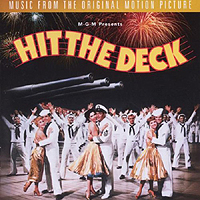 Film Soundtrack, 1955 (MGM/TCM)
Film Soundtrack, 1955 (MGM/TCM)  (3 / 5) Hubert Osborne’s Shore Leave, a dull sailors-in-port comedy from 1924, was incessantly reincarnated: as a silent movie, a Broadway musical that was filmed twice, and another movie musical with a different score. The 1936 film was the Astaire-Rogers gem Follow the Fleet, for which Irving Berlin wrote great songs; but Vincent Youmans’ stage show Hit the Deck! came first (1927). With songs like “Hallelujah!” and “Sometimes I’m Happy” (lyrics by Clifford Grey and Leo Robin), this show doesn’t deserve complete extinction, but in the realm of sailor musicals, it ain’t On the Town. MGM’s 1955 film version is plodding — yet the Youmans score, with others of his standards tossed in, sounds fine here as performed by a large cast full of musical pros. Perhaps it was because of CinemaScope that the script was padded with three couples, all of whom get a crack at the songs: they are played by Jane Powell and Vic Damone, Tony Martin and Ann Miller, Debbie Reynolds and Russ Tamblyn (dubbed by Rex Dennis). Also on hand is the enormous-voiced Kay Armen. Damone and Martin were singers, not actors, so there is more vocal tone than theater in their performances — though it’s certainly gorgeous tone. But there sure is plenty of theatricality in Ann Miller’s “Lady From the Bayou.” Miller also has fun with “Keepin’ Myself for You,” written by Youmans for the first (1930) film version of Hit the Deck! Powell and Reynolds are no slouches either, and the ear-popping early stereo soundtrack is given a fine TCM presentation on CD. — Richard Barrios
(3 / 5) Hubert Osborne’s Shore Leave, a dull sailors-in-port comedy from 1924, was incessantly reincarnated: as a silent movie, a Broadway musical that was filmed twice, and another movie musical with a different score. The 1936 film was the Astaire-Rogers gem Follow the Fleet, for which Irving Berlin wrote great songs; but Vincent Youmans’ stage show Hit the Deck! came first (1927). With songs like “Hallelujah!” and “Sometimes I’m Happy” (lyrics by Clifford Grey and Leo Robin), this show doesn’t deserve complete extinction, but in the realm of sailor musicals, it ain’t On the Town. MGM’s 1955 film version is plodding — yet the Youmans score, with others of his standards tossed in, sounds fine here as performed by a large cast full of musical pros. Perhaps it was because of CinemaScope that the script was padded with three couples, all of whom get a crack at the songs: they are played by Jane Powell and Vic Damone, Tony Martin and Ann Miller, Debbie Reynolds and Russ Tamblyn (dubbed by Rex Dennis). Also on hand is the enormous-voiced Kay Armen. Damone and Martin were singers, not actors, so there is more vocal tone than theater in their performances — though it’s certainly gorgeous tone. But there sure is plenty of theatricality in Ann Miller’s “Lady From the Bayou.” Miller also has fun with “Keepin’ Myself for You,” written by Youmans for the first (1930) film version of Hit the Deck! Powell and Reynolds are no slouches either, and the ear-popping early stereo soundtrack is given a fine TCM presentation on CD. — Richard Barrios

